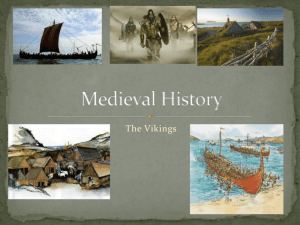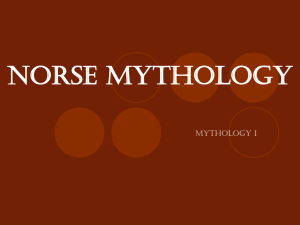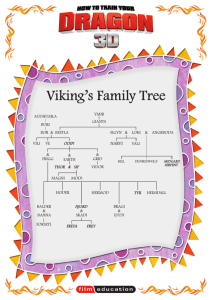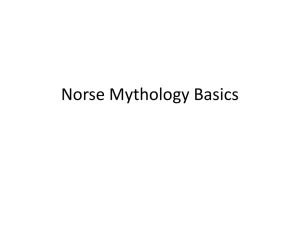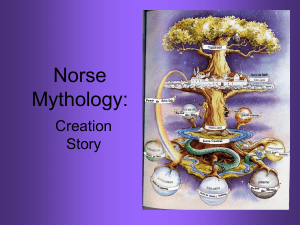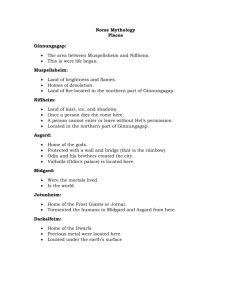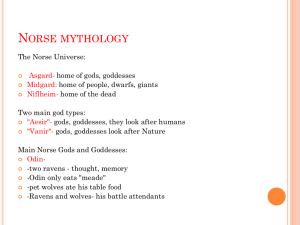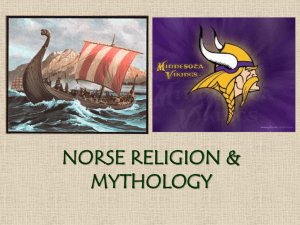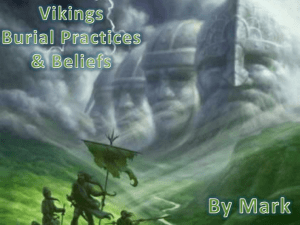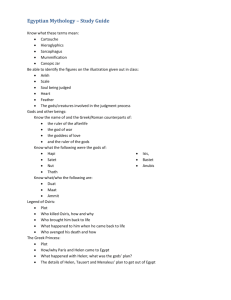norse_mythology_character_notes
advertisement
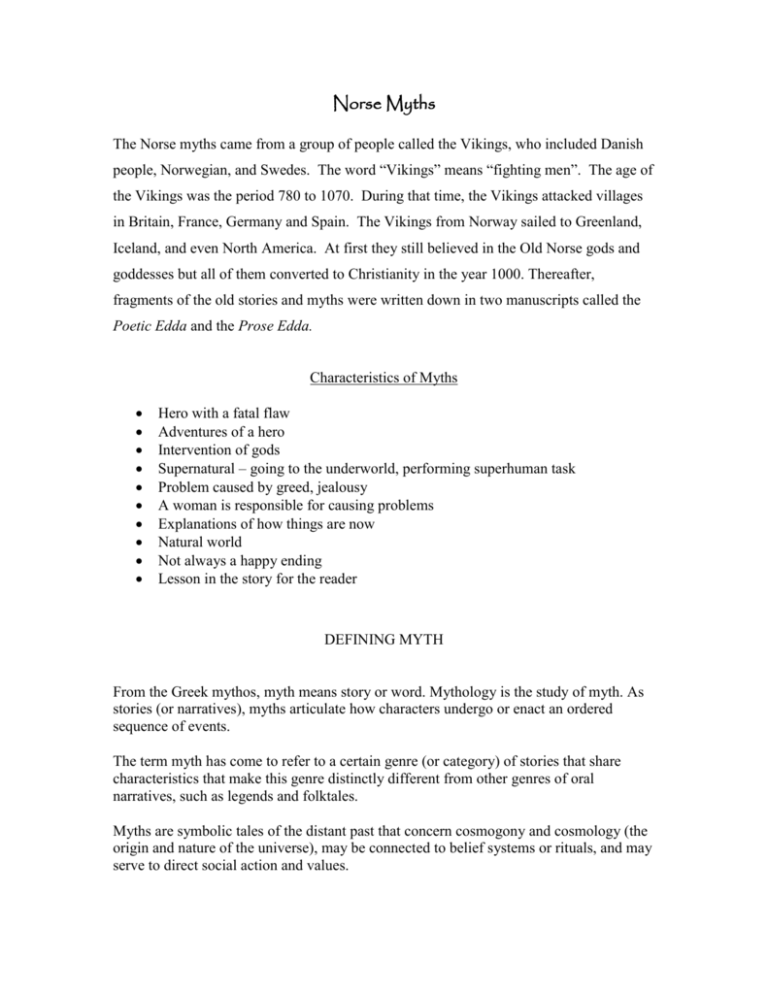
Norse Myths The Norse myths came from a group of people called the Vikings, who included Danish people, Norwegian, and Swedes. The word “Vikings” means “fighting men”. The age of the Vikings was the period 780 to 1070. During that time, the Vikings attacked villages in Britain, France, Germany and Spain. The Vikings from Norway sailed to Greenland, Iceland, and even North America. At first they still believed in the Old Norse gods and goddesses but all of them converted to Christianity in the year 1000. Thereafter, fragments of the old stories and myths were written down in two manuscripts called the Poetic Edda and the Prose Edda. Characteristics of Myths Hero with a fatal flaw Adventures of a hero Intervention of gods Supernatural – going to the underworld, performing superhuman task Problem caused by greed, jealousy A woman is responsible for causing problems Explanations of how things are now Natural world Not always a happy ending Lesson in the story for the reader DEFINING MYTH From the Greek mythos, myth means story or word. Mythology is the study of myth. As stories (or narratives), myths articulate how characters undergo or enact an ordered sequence of events. The term myth has come to refer to a certain genre (or category) of stories that share characteristics that make this genre distinctly different from other genres of oral narratives, such as legends and folktales. Myths are symbolic tales of the distant past that concern cosmogony and cosmology (the origin and nature of the universe), may be connected to belief systems or rituals, and may serve to direct social action and values. Myths are defined as: tales believed as true, usually sacred, set in the distant past or other worlds or parts of the world, and with extra-human, inhuman, or heroic characters. Gods and Goddesses Baldur – the son of Odin and Frigg. He was the most gentle and beautiful of all the gods. The entire world grieved when he was unwittingly slain by his twin brother Hod, who was tricked by Loki Freya – was the goddess of fertility. She drove a chariot pulled by cats and had a magic falcon suit. She was the daughter of Njord and the sister of Frey. Frey – was one of the Vanir, the gods of fertility. Son of Njord and the brother of Freya, he was the god of rain and harvest. Frigg – was Odin’s wife and the mother of Baldur and Hod. She knew the future, but kept all that she knew to herself. Heimdall – was the son of Odin and the guardian of the gods. He blew his trumpet to signal the end of the world. (Guardian of Bifrost the Rainbow that was the passageway to Asgard) Hermod – was the son of Odin who rode to the land of the dead to bring back Balder and Nanna. Hod- was the son of Odin, brother of Baldur. He was blind. Idun- the keeper of the golden apples of youth. She was married to the god Bragi Loki – was actually a giant, as he was the son of two giants. But a blood brother to Odin, he lived in Asgard as one of the gods. Loki was a trickster and mischief-maker and brought about the end of the world. Mimer – was a god who possessed great wisdom. Though his head was severed from his body, he continued to live and guarded Mimir’s Well, whose waters were the source of great wisdom and memory. Nanna- the wife of Baldur, who died of grief after her husbands death. Njord- was a Vanir god, or god of fertility. He was the father of Frey and Freya. Ruler of the seas and the wind, he married the giantess Skadi Norns- were three maidens who could forecast the future. The determined at the birth of every god and human whether or not the individual would have a good life or a bad life. Their names were Urd (Fate), Skuld (Being) and Verdandi (necessity). Odin – was the greatest of all the gods (similar to Zeus). He was known as the god of war and death, the master magician, the god of poetry, and lord of the runes. He presided over Valhalla, the Hall of the Slain. Any warrior who died in battle became Odin’s son and feasted with him in Valhalla. Odin was the husband of Frigg and father of Bragi, Thor, Hermod, Heimdall, Hod and Baldur. Sif – was the wife of Thor. She had beautiful golden hair which gleamed like rip corn. Sigyn- the wife of Loki. She tried to ease his terrible agony when he was punished by the gods. Skirnir- was the messenger of the god Frey. He helped Frey win the giantess Gerd for his bride. Thor – was the son of Odin and husband of Sif. Strongest of all the gods, he wielded a might hammer and was known as the god of thunder. Tyr- was the god who sacrificed his hand to the wolf Fenir. Valkyries- were warrior goddesses who rode across the sky to battlefields. They picked up the slain warriors and carried them back to Valhalla, Odin’s hall of the Slain. Vanir- were the gods of nature and fertility who fought the Aesir. When a truce was called, three Vanir- Njord, Frey and Freya went to live in Asgard. Giants, Giantesses, Dwarves Brok- was the brother of the dwarf Sindri, who gave Thor his hammer. Hrungnir- was the strongest of all giants. Eventually slain by Thor. Hymir- was a giant who owned the enormous cauldron desired by Thor. Father of the god Tyr. Sindri- was a dwarf who gave three wondrous gifts to the gods, including Thor’s hammer. Skrymir- was the trickster giant who crossed paths with Thor on his way to the fortress of Utgard Thiazi- was a giant who disguised himself as an eagle and stole the golden apples of youth from the gods. Thok- was a giantess who was actually Loki in disguise. She refused to weep for Baldur, therefore not allowing him to leave the land of the dead. Ymir- was the first frost giant. He was formed out of ice and fire. Later the gods used his body to make the universe. Creatures Fenrir- was one of Loki’s three monstrous children. He was a fierce wolf. He was bound by the gods until the end of the universe, when he broke free from his chains and fought Odin to death Hel- was the hideous offspring of Loki who ruled the realm of the dead. Midgard Serpent- was another of Loki’s children. It was a snake that lived in the sea, its body encircling all of Midgard (Earth) Sleipnir- was Odin’s powerful eight-legged horse. The fastest horse in the nine worlds, he could fly over sea and land. The Norse Universe Nine Worlds: The Norse people were often associated with the number nine. YGGDRASIL, the Tree of Life, has nine roots which feed or lead to different realms. Starting from the bottom up, there’s: 1 : HELHEIM, HEL's Domain of the Dead 2 : NIFLHEIM, the frosty Realm of Ice 3 : JOTUNHEIM, Land of the Giants 4 : NIDAVELLIR, the Land of Dwarfs 5 : SVARTALFHEIM, the Domain of the Dark Elves 6 : MIDGARD, Middle-earth, our bit, the Realm of Mankind 7 : ALFHEIM, the Land of the Light Elves 8 : VANAHEIM, the World of the VANIR 9 : ASGARD, the World of the AESIR Also fitting somehow into the picture is MUSPELL, a sort of no-man's-land of Fire Giants, and GINNUNGAGAP, the ancient Void of Chaos. And don't forget YGGDRASIL itself. This is the tree that connects all of the realms. VANIR: Rival Gods to the AESIR. They were mostly wild and rough Nature Gods and detested the more noble Warrior Gods, who included ODIN, THOR, and so on. AESIR: The Norse Top Gods, including Odin, Thor, Loki and so on………. They rule the world from the heavenly ASGARD. Their power and knowledge was greater than most other beings in Norse mythology. The VANIR were their mortal enemies. Or should that be immortal enemies? However, after wars and trickery and exciting tales, the two families of Gods were more or less reconciled. See below for image of Yggdrasil Tree/Norse Universe
